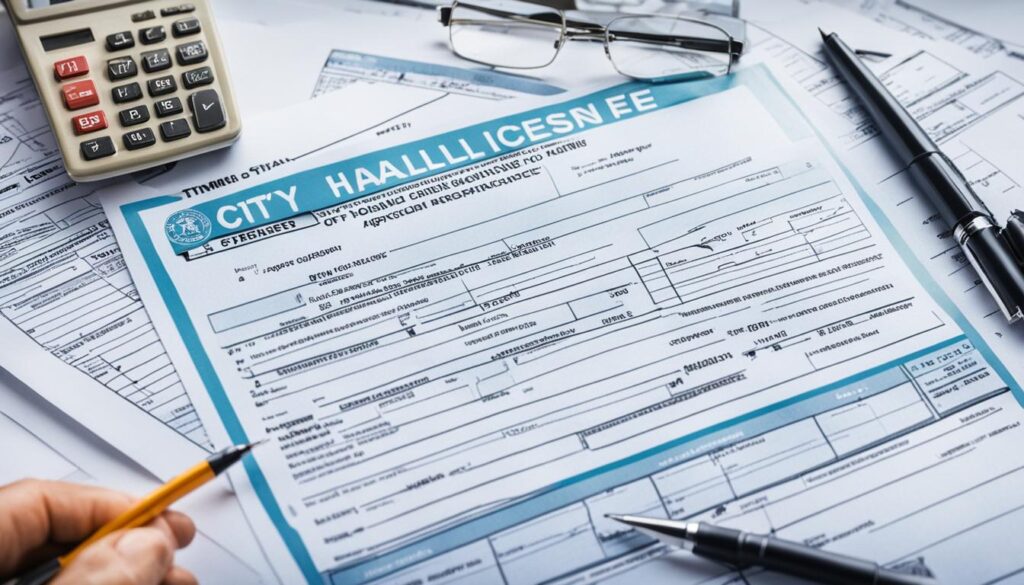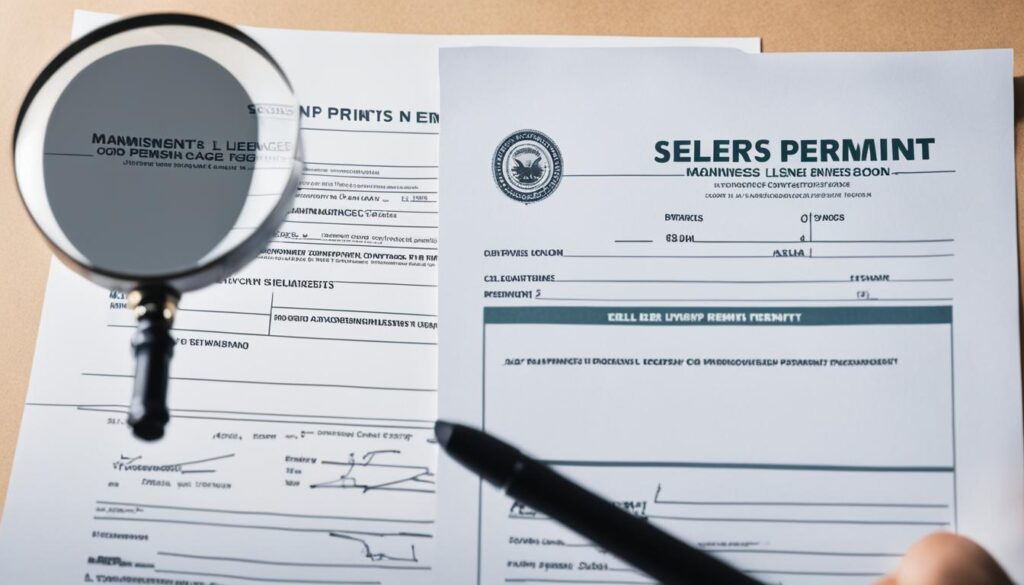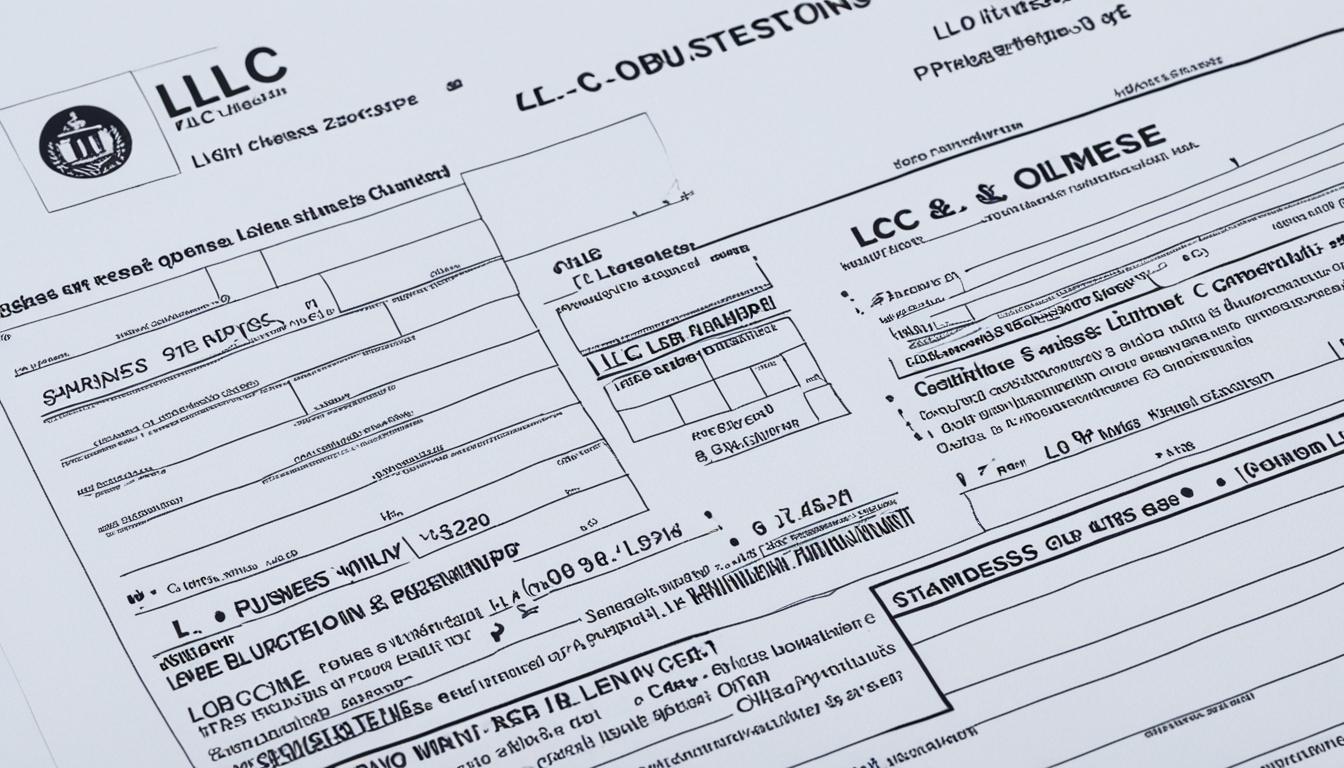Starting a business can be exhilarating, but it’s also filled with important decisions, especially when it comes to legalities. You might have found yourself pondering, “What’s the difference between a business license and an LLC?” It’s a common query among new business owners, as both terms are pivotal for your company’s compliance and protection. Understanding the difference between a business license and an LLC, known as a Limited Liability Company, is crucial. A business license is the key that unlocks your company’s door to operate within a certain locale, abiding by local laws. On the flip side, the LLC is your business’s shield, granting protection from personal liability and offering tax advantages. So, when talking LLC vs business license, think of them not as competitors but as complementary supporters of your business journey.
Key Takeaways
- A business license is typically mandatory for legal operation in your area.
- An LLC affords personal liability protection separating personal and business assets.
- Both a business license and an LLC may be required for complete legal compliance.
- Forming an LLC can provide potential tax benefits and flexibility in management.
- Regardless of the business structure, adhering to local laws is imperative.
- Understanding the respective roles of licenses and LLCs can smooth your path to successful entrepreneurship.
Introductory Insights on Business Licenses Versus LLCs
When you’re venturing into the realm of entrepreneurship, it’s essential to understand the nuances of legal requirements, particularly what’s the difference between a business license and an LLC. Initially, it might sound a bit perplexing, but don’t worry, we’re here to clarify this for you. A business license is essentially permission granted by government authorities that allows you to conduct business within a particular area. Depending on your business scope, you might need to procure this license at the local, state, or even federal level.
On the other hand, an LLC or Limited Liability Company, is not about permission but protection. Establishing an LLC means your business is its own legal entity, setting a clear line of demarcation between the company’s liabilities and your personal assets. This is critical in the case of legal matters or debts because you, as the owner, are not held personally liable. So, when you’re juggling the choices of business license vs LLC, consider them as complementary rather than either-or options.
- Business license: Required to legally operate your business in compliance with local, state, or federal regulations.
- LLC: Provides personal liability protection and can influence how your business is perceived by customers and creditors.
It’s important to note that having an LLC doesn’t negate the need for a business license. Both are pivotal steps to ensure you’re on the right side of the law when you open your doors for business. As you move forward with setting up your business structure, keeping these distinctions in mind will aid you in establishing a solid foundation for your business endeavors.
Stay tuned as we delve deeper into the requirements and benefits of both a business license and LLC, guiding you through the decisions that will secure the future of your business.
Understanding the Basics of a Business License
Navigating the intricacies of business licenses can seem daunting at first. However, with a proper explanation of how to get a business license and what it entails, you’ll have the knowledge to lay the groundwork for your business’s compliance and success.
Definition and Purpose of a Business License
A business license is more than just a formal piece of paper—it’s an essential asset for your company. This document serves as a passkey, allowing you to carry out your entrepreneurial activities within a specific locale while staying aligned with various legal stipulations. The purpose of acquiring such a license is to affirm that your business operations meet the necessary safety, health, and professional standards set by governing bodies. This ensures that you’re contributing positively to public welfare and community standards.

Different Types of Business Licenses
Depending on where and how your business operates, you may need more than a simple Local business license. Certain business ventures necessitate a state business license, especially those that involve licensed professionals, such as healthcare providers or real estate agents. For activities that intersect with federal oversight areas like wildlife, aviation, or alcohol, you’ll need to secure a federal business license. It’s not just about adhering to regulations; it’s about ensuring that your business is legitimate and prepared for growth in any industry or location.
- Local Business License
- State Business License
- Federal Business License
Industries that Require Special Licenses
Stepping into industry-specific business licenses, you’ll find that certain sectors demand a more rigorous licensing process. For example, if you’re providing childcare services, financial advice, or medical care, it’s not just about having a business license—you need specialized professional licenses as well. These special licenses are crucial for maintaining high standards of service and ensuring that only qualified individuals are entrusted with such significant responsibilities.
- Healthcare
- Childcare Services
- Financial Services
While obtaining the correct business license may seem like a hurdle, consider it a stepping stone to your business’s future. It may require an investment of time and resources, but securing the right types of licenses is a testament to your commitment to quality, compliance, and long-term success.
Breaking Down the Structure of an LLC
If you’re exploring the most suitable business structure for your endeavors, you may have come across the term LLC. As a key player in the realm of business entities, understanding the LLC explanation is crucial. Let’s delve into what an LLC truly is and the array of benefits it can offer to you as a business owner.
What is an LLC?
An LLC, or Limited Liability Company, is a business structure that is celebrated for its flexibility and the protections it affords its members. The allure of the LLC lies in its hybrid nature, which encapsulates the legal safeguards of a corporation with the tax efficiencies and operational elasticity typical of partnerships or sole proprietorships. When you form an LLC, you create a distinct legal entity that’s separate from your personal finances and assets.
Benefits of Operating as an LLC
- Personal Liability Protection: One of the standout features of an LLC is the shield it provides to its members against personal liability. This means your personal assets are protected in the event that your business faces legal challenges or incurs debt.
- Flexible Tax Filing: The types of LLC taxation can be customized to best suit your financial situation. You have the option to be taxed as a partnership, corporation, or as a sole proprietor, which can lead to significant tax savings.
- Pass-Through Taxation: Often, LLC members gravitate towards pass-through taxation, a benefit that allows profits and losses to be reported directly on your personal tax returns. This avoids the burden of double taxation that corporations often endure.
In essence, an LLC serves as a protective vessel and a flexible structure for your business. Whether you’re a solo entrepreneur or a team of corporations, the formation of an LLC can be tailored to meet your business needs while providing substantial financial and legal benefits.
Legal and Financial Implications: LLC vs Business License
When you’re diving into the world of entrepreneurship, understanding the legal and financial underpinnings of your business structure is key. Weighing the pros and cons of an LLC vs business license is essential, as each plays a pivotal role in the foundation and operation of your business.
One of the primary considerations is legal compliance with LLC and business license regulations, which can markedly influence your company’s legal standing. A business license is a must-have for legal operation within your city or state, akin to a permission slip for entrepreneurship. On the flip side, forming an LLC can safeguard your personal assets from business-related litigation or debts, creating an essential barrier between your personal finances and business obligations.
Financial implications of LLC setup include a bevy of benefits, especially when it comes to taxation. Unlike traditional corporations, LLCs are subject to pass-through taxation, a system where the business’s profits and losses are passed directly to you, the member, to be filed on your individual tax returns. This can streamline the tax process and potentially reduce your overall tax burden.
- Protect Personal Assets: By separating personal and business finances with an LLC, you minimize the risk to your personal wealth if your business faces legal challenges.
- Ensure Compliance: Holding a current business license keeps you in good standing with local authorities, helping you avoid fines or business interruptions.
- Optimize Tax Outcomes: The structure of an LLC can offer a more advantageous tax situation, allowing for greater flexibility and potential savings.
In essence, while a business license and an LLC serve distinctive purposes, both are integral for the lawful and financially sound operation of your business. Navigating the requirements and benefits of both will position you for success in today’s competitive marketplace.
Navigating Business Compliance: License and LLC Requirements
Embarking on a new business venture means navigating the waters of official documentation. Ensuring that your business complies with the necessary regulations is not only prudent but also imperative. When it comes to setting up your business, understanding and fulfilling both business license requirements and LLC formation requirements are fundamental steps towards establishing a solid foundation.
Steps to Obtain a Business License
Achieving compliance begins with obtaining a business license, a gateway to operating legally in your chosen location. The journey to this milestone involves several key steps:
- Identify the specific licenses your business requires based on your location and industry. This could range from general business operations to specialized permits for health, food service, etc.
- Secure the necessary documentation to clarify your business activity, ownership, location, and other details as required by the issuing authority.
- Fill out an application and submit it, along with any required fees, to your local government office or through the SBA’s online resources.
- Understand that some businesses may require additional inspections or adherence to specific regulations before a license is granted.
Process of Forming an LLC
The responsibility of business compliance extends to the structure of your organization. Forming an LLC is a strategic move that comes with a distinct process:
- Choosing and registering a unique business name that complies with your state’s LLC regulations is the initial step.
- You’ll need to file Articles of Organization with your state’s Secretary of State office or equivalent and pay the necessary fee.
- Appointing a registered agent is crucial as they will be responsible for handling legal documents on behalf of your LLC.
- Although not mandatory in all states, having an operating agreement is advisable to set clear expectations about the LLC’s internal operations and member expectations.
Whether you’re just beginning the LLC formation process or taking the final steps in obtaining a business license, remember that diligence in these areas ensures the ongoing health, legitimacy, and success of your business endeavors.
Exploring the Nuances of a Seller’s Permit Versus Business License
When you’re in the throes of setting up your business, understanding the intricacies of legal documentation is paramount. If you’re selling goods, grasping the difference between a seller’s permit and a business license is crucial for operating a business legally. Let’s dive into what sets these two permits apart and why they’re both pivotal for your business’s compliance.
A seller’s permit, also known as a sales tax permit or reseller’s license, is a state-issued document that gives you the authority to sell products within that state and collect sales tax on those sales. This tax is then paid to the state government, typically on a quarterly or monthly basis. Without this permit, you would be operating against state law every time a product is sold.
- Key purpose: Authorize the sale of goods and collection of sales tax.
- Necessity: Mandatory for any business selling tangible goods that are taxable.
In contrast, a business license is a local or state-issued authorization that permits the legal operation of a business within a particular jurisdiction. This applies to all businesses, irrespective of whether they sell goods or services, and is a fundamental requisite to ensure that your business is recognized by the local or state government.
- Broad legality: Legal operation in a jurisdiction regardless of business type.
- Variability: Requirements can differ significantly between localities and states.
It’s not a matter of choosing one over the other—many businesses will find that they need both a seller’s permit and a business license to operate fully within the bounds of the law. On top of these permits, there might be other industry-specific permits or licenses needed. Always check your local and state regulations to ensure you’re not missing any crucial documentation that could interrupt your business flow.

Remember, the goal here is to avoid hefty fines or legal challenges that can arise from non-compliance. Operating legally not only protects you from potential penalties but also builds trust with your customers. They can have confidence that they are dealing with a reputable business that takes its obligations seriously.
Understanding the business license vs seller’s permit puzzle isn’t just a bureaucratic exercise—it’s a fundamental part of your business infrastructure. Tackle this early on, and you’ll smooth out a significant part of the road ahead, allowing you to focus on what you do best: growing your business.
Does Your Business Need Both a License and an LLC?
Embarking on a business venture brings the excitement of bringing your ideas to life, but it also requires navigating the complexities of legal compliance. Understanding the need for both a business license and an LLC can be critical for your operations, and making informed decisions can offer comprehensive business protection.
Operating with Just One: Risks and Limitations
While you might consider operating under a sole proprietorship with just a business license or forming an LLC without a business license, such approaches come with considerable risks. If you choose to operate without an LLC, remember that you expose yourself to personal liability for debts and legal claims against your business. On the other hand, skipping the crucial step of obtaining a business license can result in steep penalties and even the closure of your business due to non-compliance with local laws.
- Lack of Liability Protection: Operating without an LLC means there’s no clear distinction between personal and business assets, potentially jeopardizing your savings, home, or other personal property in a legal dispute.
- Legal Consequences: Missing a business license can halt your operations, lead to fines, or tarnish your reputation with customers and in the market.
- Operational Limitations: Sole proprietorships have limited growth potential and could face challenges in areas such as raising capital and attracting partners.
The Added Value of Having Both
Combining the legal structures of both an LLC and a business license fortifies your business, creating a robust framework for success. Here’s how the dual approach can be beneficial:
- The business license ensures adherence to local regulations, allowing you to operate without legal disruptions.
- An LLC offers a shield for personal assets, providing peace of mind and the confidence to take business risks that can lead to growth.
- Together, they pave the way for favorable tax strategies, potential savings, and efficient management of business profits and losses.
Incorporating these two elements into your business framework strengthens the foundation of your business—equipping you to withstand turbulent legal waters and giving you the freedom to focus on scaling and thriving in your chosen market.
Conclusion
In wrapping up the exploration of the business license and LLC comparison, it’s clear that these two components play pivotal roles in the foundation and growth of your business. A business license is your green light for getting a business license ensures that your venture ticks the right boxes in terms of legal compliance. In essence, it’s your ticket to operate within the regulations of your chosen locality.
On the other hand, the decision of forming an LLC is about building a fortress around your personal assets. The liability protection and potential tax advantages that an LLC offers can be significant boons to you as an entrepreneur. It elevates your business structure, providing a separate entity that stands on its own, affording you security and peace of mind.
Ultimately, while they serve different purposes, both are indispensable tools in your business arsenal. They work in tandem to ensure that you’re not only legally compliant but also strategically poised to tackle the financial and legal challenges of the business world. Equip yourself with both, and you’ll set a solid foundation as you stride confidently into the future of your enterprise.
FAQ
What’s the Difference Between a Business License and an LLC?
A business license is a permit issued by a government entity allowing a business to operate in a specific jurisdiction, while an LLC (Limited Liability Company) is a business structure that provides personal liability protection and tax benefits for its owners, known as members.
Why Do Businesses Need a Business License?
A business license ensures that a business is legally allowed to operate in a particular area and is compliant with local, state, or federal regulations. This is a necessary step for legal business operations and public safety.
What Are the Different Types of Business Licenses?
Business licenses vary based on the level of government and the type of business. They include local licenses for small businesses, state licenses for certain professions, and federal licenses for businesses engaged in federally regulated activities.
Which Industries Require Special Licenses?
Industries that have a direct impact on public health and safety typically require special professional licenses. This includes healthcare, finance, child care, and others that ensure practitioners meet specific qualifications.
What is an LLC?
An LLC, or Limited Liability Company, is a business structure that offers its owners legal protection from personal liability for business debts and obligations, as well as flexible tax benefits.
What Benefits Does Operating as an LLC Provide?
Operating as an LLC provides personal liability protection, flexible tax options (like pass-through taxation), and can offer a simpler operational structure compared to corporations.
What Are the Legal and Financial Implications of Operating Without an LLC or Business License?
Operating without an LLC or business license exposes the business to potential legal penalties, personal liability risks, and the loss of potential tax benefits. It’s important to ensure compliance with both for full legal and financial protection.
How Do I Obtain a Business License?
To obtain a business license, you typically need to identify and meet the specific requirements for your business, submit an application, provide necessary documentation, and pay any associated fees to the relevant government authority.
What is the Process For Forming an LLC?
To form an LLC, you must choose a unique business name, file the Articles of Organization with your state, pay any required fees, and designate a registered agent. Creating an operating agreement, although not mandatory, is recommended.
What’s the Difference Between a Seller’s Permit and a Business License?
A seller’s permit allows businesses to sell goods and collect sales tax within a state, while a business license grants the authority to operate a business within a particular jurisdiction. Both are required for legal operation, depending on your business activities.
Can I Operate My Business With Just a Business License or Just an LLC?
While you might be able to start a business with just one, it’s advised to have both a business license and an LLC. Operating without a business license can lead to non-compliance penalties, and without an LLC, you lack personal liability protection.
Why is it Advantageous to Have Both an LLC and a Business License?
Having both an LLC and a business license offers comprehensive protection for your business. The business license covers legal operations within your jurisdiction, and the LLC provides liability protection and potential tax benefits.




